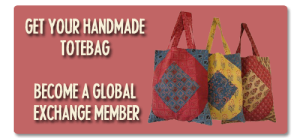Last month, Global Exchange Fair Trade Store Manager Kara Roguly traveled to India with Handmade Expressions to meet with the artisans who make our Fair Trade tote bags and other beautiful items sold at our stores and also delivered the messages you shared with the artisans as part of our #BagsAcrossBorders campaign. Read on as Kara shares her experiences.
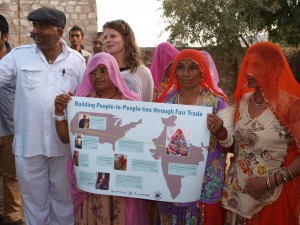 On a bus just outside the city of Barmer, I want to say the landscape changes but really the natural environment becomes visible. Looking out the window, the gross amount of city trash, most notably plastic bottles, disappears into soft tan colored Rajastani earth. I can see Tulsi and Neem trees; small in stature, their shade provides a surprising amount of relief from the desert sun. I see groupings of people and animals breaking from the heat in these sporadic shade pockets.
On a bus just outside the city of Barmer, I want to say the landscape changes but really the natural environment becomes visible. Looking out the window, the gross amount of city trash, most notably plastic bottles, disappears into soft tan colored Rajastani earth. I can see Tulsi and Neem trees; small in stature, their shade provides a surprising amount of relief from the desert sun. I see groupings of people and animals breaking from the heat in these sporadic shade pockets.
I am excited for today. Today is the reason that I am in India. Our long-time Fair Trade partner, Handmade Expressions invited Global Exchange to northwest India to meet with a community of artisans who specialize in traditional wood block-printing and the production of our Fair Trade Eco-Shopper bags.
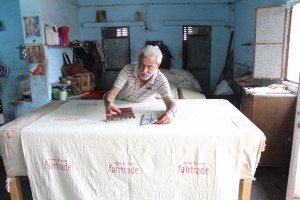 Today I am going to give the map Global Exchange and our members created for this artisan community. The purpose of the map is to show where Eco-Shoppers live after production and to bring the artisans YOUR messages of why you love your Eco-Shopper.
Today I am going to give the map Global Exchange and our members created for this artisan community. The purpose of the map is to show where Eco-Shoppers live after production and to bring the artisans YOUR messages of why you love your Eco-Shopper.
In a time of bigger, faster, and cheaper production we want to thank this block-printing community for valuing sustainable and holistic working environments, and know that there are conscious consumers who value and love this work. Global Exchange has gifted these handmade Eco-Shopper bags to our members in exchange for their support of our organization and their commitment to Fair Trade.
While Fair Trade can sometimes feel like an abstract concept, we want to bring to life the connection between the artisan and the conscious carrier of these Fair Trade bags!
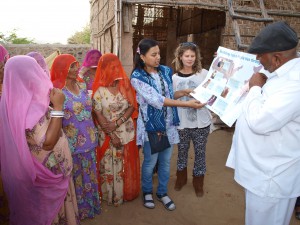 Driving into small village paths in a massive bus with the words TOURIST across the windshield, and 22 Americans de-boarding, never failed to bring all the locals out of their homes for a laugh and a long stare.
Driving into small village paths in a massive bus with the words TOURIST across the windshield, and 22 Americans de-boarding, never failed to bring all the locals out of their homes for a laugh and a long stare.
Walking into the court yard of the workshop we are greeted by a large tree and Ranaml Ji. Ranaml, the founder of the workshop, is wearing all white except for a black cap and gold hoop earrings. To my right I see a water filtration system, which allows water to be reused 15 times; it is next to the indigo fermentation process and far to my left is a huge rectangle thatched roof where women stitch. Overhead are laundry lines of wet block printed fabric hanging to dry that act as an air conditioner, it feels wonderful when the breeze passes through the wet cloth and blows cold air on you. Inside, I see Global Exchange Eco-Shoppers being block printed and hand sewn.
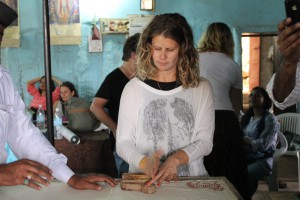 Once settled, I get a chance to speak with Ranaml Ji. He was born and raised in Barmer, India, after his father immigrated from Pakistan. Ranaml’s father taught him how to block print when he was in grade 6. He fell in love with the art, and pursued block printing not by force but with passion. Ranaml has four children, two daughters and two sons. One of his sons works with him, making theirs a four generation block printing family.
Once settled, I get a chance to speak with Ranaml Ji. He was born and raised in Barmer, India, after his father immigrated from Pakistan. Ranaml’s father taught him how to block print when he was in grade 6. He fell in love with the art, and pursued block printing not by force but with passion. Ranaml has four children, two daughters and two sons. One of his sons works with him, making theirs a four generation block printing family.
The community employees 20 full time artisans. I asked how many days a week is typical for work; he replied, “artists work everyday because we love what we do”. Block printing is traditionally a mans art form although younger women are starting to learn the trade, including one woman who prints at Ranaml’s workshop. In general, women apply the finishing and details to the work together under the thatched roof.
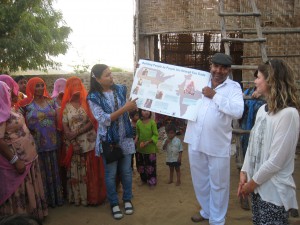
I asked Ranaml what his favorite colors to use are: “Indigo and red, even though I have been wearing all white for the past 15 years”. I also asked Ranaml if he has any words that he would like me to bring back?
“I want people to understand the value of natural dye and block printing.”
Living in an area with no agriculture, block printing is the #1 job for this community; because demand is down and prices are up, the sustainability of their future is concerning for Ranaml.
After lunch, I am walked through the entire process of block printing, from holding a indigo rock in my hand, to seeing our Eco-Shoppers straps being sewn on.
After I meeting the artisans, it’s time to present the map. I invite all artisans to come together outside. Men gather on one side, women on the other. The woman who is featured on the map, Seeta Ji, is here today!
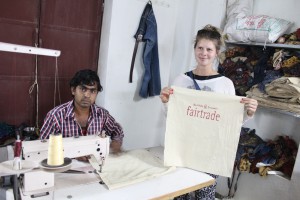
With Handmade Expressions’s Rashmi translating, I’m able to present to Ranaml Ji, Seeta Ji, and all the artisans who make our Eco-Shopper your messages and photos about what you love about your Eco-Shopper!
Rashmi takes the time to read all the messages to the artisans, and I can see their smiles and feel how proud they are. This map connected the artisans to their work, outside of India, and to their conscious customers. The artisans could see who is wearing their bags, how they wear them, and what they love about them. The connection was a success, the energy was very high and I did not want to get back on that TOURIST bus.
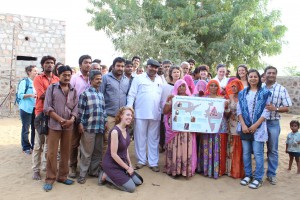
Before I left, Ranaml Ji invited me to block print my very own Eco-Shopper! It came out beautifully, but what can I say, I had a great teacher! I was also able to spend time and connect with one of the women artisans. Her name is Kamala, and I will share more about our time together in my next blog.
“We are all in this together, and we are all doing good work together” was the mantra that kept coming up for me.
Thank you for participating in this campaign and thank you for shopping Fair Trade.
YES, your purchase is the action that gives opportunity to communities like this one to thrive. This artisan community, Handmade Expressions, SETU, and the group of Fair Trade American retailers were all connected through this powerful action of acknowledgement.
TAKE ACTION
- Support our work which has a direct impact on Fair Trade artisans in India and around the world! And join the hundreds of people who carry around a stylish Handmade Expressions tote bag.
- Get a day-to-day account from Ray from One World Fair Trade who also participated in the trip.

